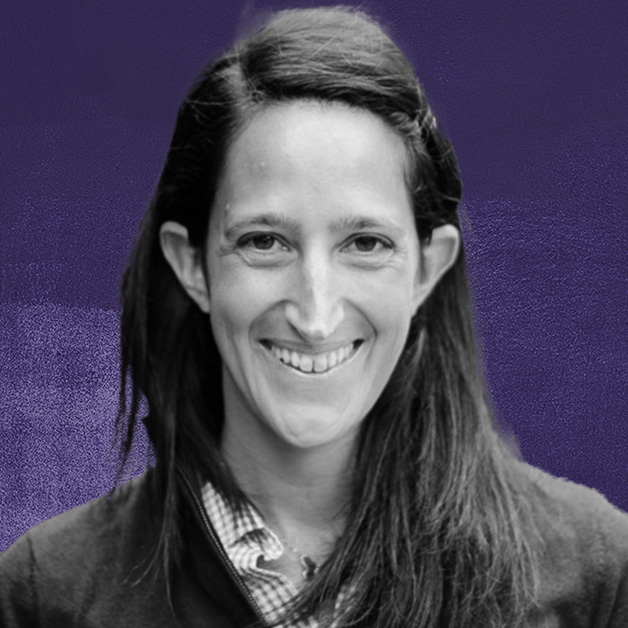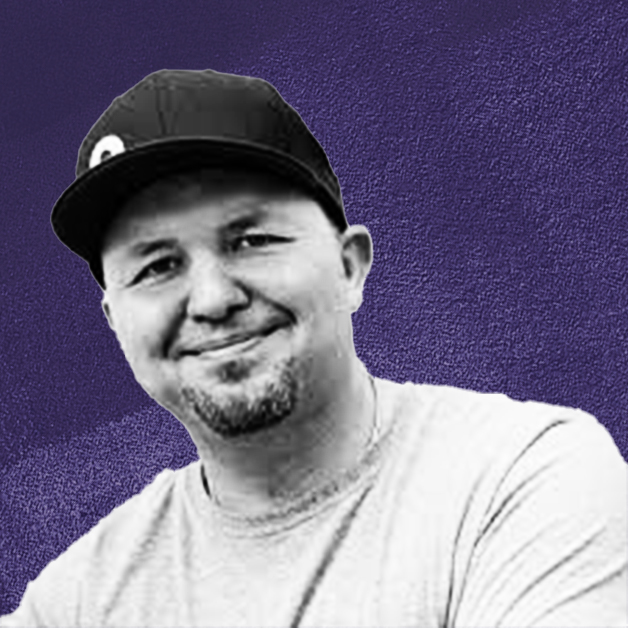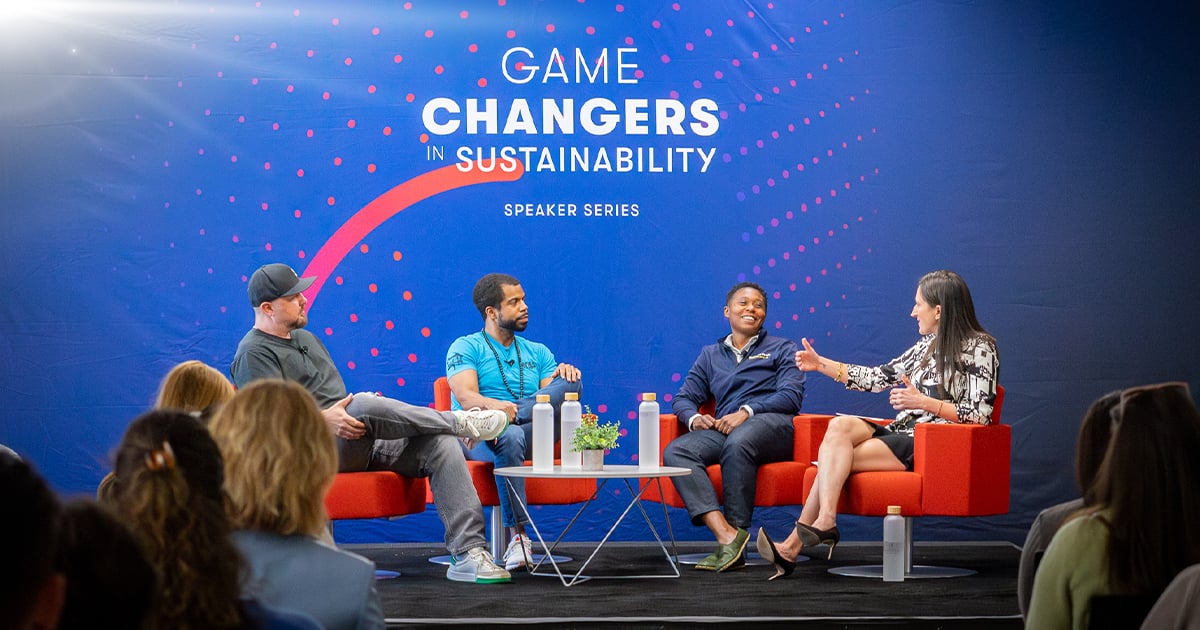
Kogod School of Business
On a campus that prioritizes the intersection of sustainability and entrepreneurship like few others, Earth Day is no small occasion.
So, April 22 proved a fitting opportunity to welcome the founders of three sustainability-minded small businesses to the Kogod School of Business as part of the school’s ongoing, unique speaker series.
Students, faculty, alumni, and guests gathered to hear stories of resilience, passion, and thinking outside the box during the hour-long discussion, which was held as part of the Gamechangers in Sustainability series. This series highlights how the most innovative leaders create a more sustainable world.
For the second straight year, the series took the shape, on Earth Day, of a Founders Forum featuring a panel of three change-driven entrepreneurs.
The founders who participated in this year’s forum included:
- Sarah Frimpong, founder and CEO of Wellfound Foods, a small business that provides quick and healthy food on the go at 75 mobile locations across the DC region.
- Myles Powell, founder and CEO of Myles Comfort Foods, which sells “real food that’s frozen,” re-imagining what the quality of frozen food might look like—all with an eye on sustainability.
- Amir Mostafavi, founder and CEO of South Block, which sells from-scratch smoothies, acai bowls, and juices at more than a dozen DC area locations, featuring ingredients sourced sustainably.
The discussion focused on how Frimpong, Powell, and Mostafavi have each managed to find sustainable ways to grow business concepts that, at their essence, have traditionally come with inherent hurdles in waste, single-use plastics, and overall carbon footprint.
Yet, as each panelist explained, this group has managed to generate a lasting business model while growing ethically and scaling with their company’s original culture in mind; the latter, an essential ingredient in any startup’s success, noted the event’s moderator, Danielle Vogel, Kogod professor and assistant director of the Veloric Center for Entrepreneurship.
A great idea doesn’t make it very far if you can’t build a team around it. Your team is your force multiplier."

Danielle Vogel
Assistant Director, Veloric Center for Entrepreneurship
Finding Success in Sustainability
Each of the three entrepreneurs who participated in the 2024 Founders Forum are noteworthy for the uniquely sustainable approach they’ve taken to operating their business, often in ways few of their peers have.
South Block
Mostafavi, for instance, has prioritized sourcing ingredients for South Block’s smoothies, juices, and bowls through fair trade—including its acai.
“We’re making sure those farmers are paid fairly for the product. We know exactly where it’s coming from. We’re helping to sustain the local economy of those farmers and their communities, and we’re also helping to support preserving trees in the rainforest,” Mostafavi told the audience. “If we can support product that grows on trees…then there’s no reason to cut down the trees.”
Of course, for a company that’s also known for selling smoothies and juices, straws are famously a hurdle, considering the waste those single-use plastics present.
For its part, South Block recently partnered with a company called Strawfish to purchase straws made from oyster shells, which naturally decompose in landfills whether correctly recycled by the customer or not.
Myles Comfort Foods
For Powell, finding planet-friendly ways to operate is a particular opportunity and challenge, considering frozen foods have traditionally not been a sector known for sustainability.
“We play in the frozen foods aisle, which historically has been something I call the ‘aisle of sacrifice,’” Powell quipped.
Yet, Myles Comfort Food had prioritized ethical sourcing, quality, and sustainability in distributing its homemade mac and cheese to major retailers like Target and Whole Foods.
It’s been a multi-step process that started at the beginning of the supply chain with non-GMO meats.
Currently, as Powell’s team works toward its self-admitted “huge goal” of reducing the packaging and plastic use with its products, the company has, in the meantime, joined 1% for the Planet, a global network of companies that commit to contributing at least 1 percent of their annual sales to environmental organizations.
“It’s one step in that right direction,” Powell said. “Now, it’s, ‘how do we add on top of that?’”
Wellfound Foods
Reducing waste has likewise been a focus for Frimpong. Wellfound Foods has some 80 vending machines for its freshly prepared meals across the DC region, with locations ranging from the White House to Dulles International Airport and Anderson Hall on the AU campus.
Early on, Frimpong said, an astonishing 20 to 25 percent of the thousands of meals Wellfound Foods’ chefs prepared daily went wasted.
With the help of proprietary forecasting algorithms, the company has dropped its waste rate closer to 10 percent. Long-term, the company has its eyes on 8 percent.
Frimpong explained that one hundred percent of what isn’t bought now is donated to local food rescue partners.
“Obviously, we don’t want everything to sell out. We want to make sure there’s enough out there,” Frimpong said. “But we don’t want to have too much food waste either. That is a huge challenge. I also see it as a huge opportunity for us to differentiate our business.”
Scaling with Culture
Regardless of the industry, growing a startup requires a team, and a team can’t carry out the mission effectively without the right culture.
That’s been a priority for these three founders and was critical to the Earth Day discussion.
At some point, you’ve got to make a conscious decision that company culture is the most important thing to your business. You have to talk about it all the time.”

Amir Mostafavi
Founder and CEO, South Block
As South Block has grown to 300 employees, it’s been a critical point of focus for Mostafavi. A key component is hiring the right people, which Powell sees as particularly important during Myles Comfort Foods’ initial growth phase.
“You’re not going to be an employee that has a very set to-do list that comes in at 9 and leaves at 5. You’re in it with me. This is ground zero,” Powell said. “It’s not meant for everyone at an early stage. I need people that want to ride.”
Indeed, those less tangible attributes for prospective employees—and a willingness to do what it takes to succeed—are critical components to growing a company in the mold of a founder’s intended culture, Frimpong concurred.
“There’s this other set of soft skills and that flexibility that we’re trying to see,” Frimpong explained. “Can you really come in here and ‘come along for the ride with us?’ Because as an organization, Wellfound is very resilient. And it’s the reason we’re still here after all this time.”
That last comment prompted Vogel to turn to the audience of Kogod students with a word of advice for those preparing for an interview:
“Think about not just the question they’re asking but the values they’re trying to assess,” Vogel suggested.
Following the planned discussion, the founders took part in a question-and-answer session with students, followed by a luncheon featuring food created—fittingly—by their companies. The gathering doubled as a networking opportunity for students and guests.
Now in its second year, the Gamechangers and Sustainability series has brought close to a dozen leaders from change-driven companies to campus, with guests ranging from the founders of DC area startups to executives at the helm of some of the world’s most powerful companies, such as Marriott International, EY, and Xylem.
Learn more about the Kogod School of Business's commitment to sustainability here.
